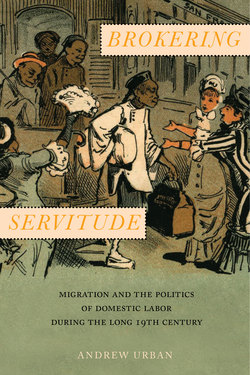Brokering Servitude

Реклама. ООО «ЛитРес», ИНН: 7719571260.
Оглавление
Andrew Urban. Brokering Servitude
Отрывок из книги
BROKERING SERVITUDE
General Editors: Daniel Bender and Kimberley L. Phillips
.....
White servants’ desire to control who got to participate in labor markets for domestic service and their attempts to exclude black and Chinese workers from job competition were emblematic of how they viewed white settlerism. In this book I use white settlerism, a complicated and multifaceted idea, as a concept that elucidates how white immigrant workers and their allies insisted that they had value as racial subjects that transcended how their worth was defined by labor markets. The goal here, as theorist Patrick Wolfe urges, is to grasp how white settler colonialism represented a “structure not an event.”42 Irish women’s imagined transition, for instance, from wage-earning domestics to unpaid mothers and wives informed the larger philosophy that brokers of their labor professed to, genuinely or otherwise, when it came to intervening in how they moved along the various supply chains that fed household labor. It is possible to see racially inclusive settlerism reflected in the frontier embrace of Irish Catholic immigrant women sent in the 1850s to places like Illinois and Wisconsin, where emigration boosters advertised that wage-earning migrants would be treated as if they were daughters. At the same time, this did not preclude Irish servants from being embraced by white republicans and laboring classes as producers in their own right, whose breadwinner status, defined by the remittances they sent to families back in Ireland, made them independent contributors.
White settlerism also manifested in seemingly less obvious places, like Ellis Island. There immigration officials treated unaccompanied women arriving from Europe as future members of the nation’s reproductive population who deserved protections and required control, but who were not to be treated as disposable labor or undesirable subjects. As the political scientist Aziz Rana argues, settlerism was one “face” of American freedom, distinguished by its democratic aspirations and desire to empower certain subjects, yet accessible only to groups and individuals of a certain skin color.43 Horatio Seymour, the former governor of New York and the Democratic nominee for the presidency in 1868, captured this mind-set when he expressed the opinion that while “the Chinese have useful qualities” such as being “good servants, ready to do the work of men or women,” these were not “traits which will build on this Continent a great and high-toned power.”44 In these contexts, when Irish servants usurped middle-class rituals as their own, by dressing and acting as if they were the rightful mistresses of the homes in which they worked, their actions represented both a power struggle between capital and labor and a conflict over who was eligible to lay claim to gendered citizenship. More generally, producing domesticity in the nineteenth and early twentieth centuries was dangerous and backbreaking labor in addition to being degraded in status. To make those who were defined in racial and class terms as favored representatives of the population live (and live splendidly if they could afford to) meant that the providers of menial services—those hewers of wood and drawers of water—could not be barred or exiled as unwanted subjects from the social life of the nation altogether.45
.....